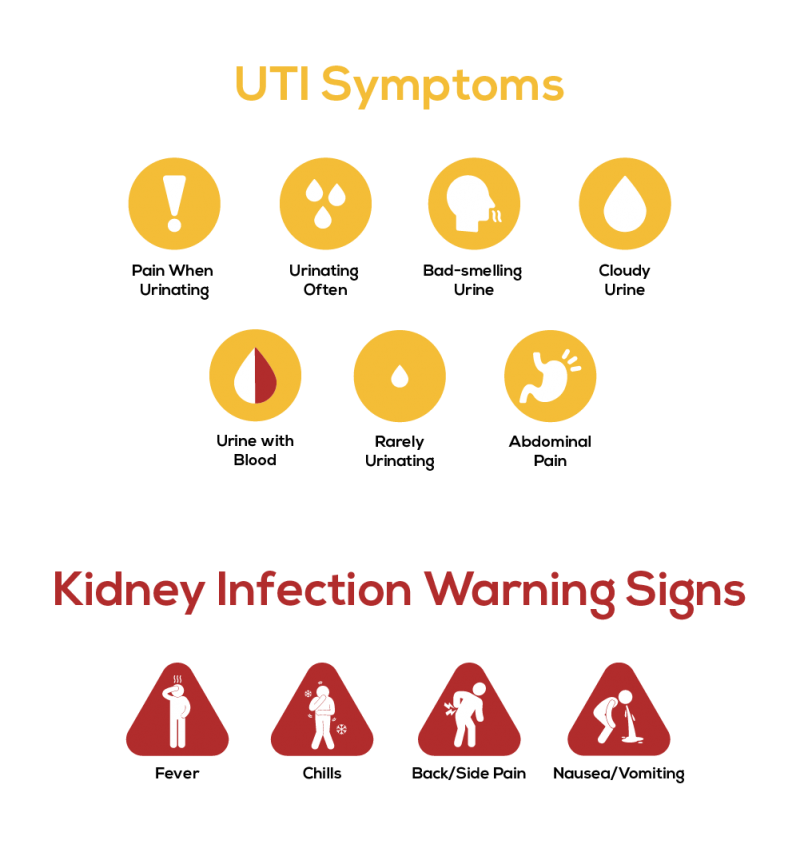Kidney Stones vs UTI: Exactly How to Determine and Treat Each Problem Properly
Kidney Stones vs UTI: Exactly How to Determine and Treat Each Problem Properly
Blog Article
Understanding the Secret Distinctions In Between Kidney Stones and Urinary System System Infections: An Extensive Introduction for Individuals
Recognizing the differences in between kidney stones and urinary system system infections (UTIs) is crucial for patients who may be experiencing comparable symptoms yet deal with significantly different health and wellness obstacles. While both problems can manifest discomfort in the reduced abdominal area or back, their underlying reasons, analysis methods, and therapy procedures diverge significantly. A nuanced comprehension of these distinctions not only help in exact self-assessment however additionally notifies discussions with doctor. As we check out these vital facets, it comes to be clear that recognizing the special features of each problem can greatly affect client outcomes. What might be the very best strategy to addressing these distinctions?
Review of Kidney Stones
The development of kidney stones, a uncomfortable and often incapacitating problem, underscores the important relevance of maintaining renal health and wellness. The key kinds of kidney stones consist of calcium oxalate, calcium phosphate, uric acid, struvite, and cystine stones, each with distinctive reasons and risk elements.
A number of variables add to the development of kidney stones. Additionally, metabolic problems and certain clinical conditions may incline people to stone formation.
Symptoms of kidney stones can include serious flank queasiness, pain, and hematuria, which frequently motivate immediate clinical assessment. Treatment alternatives differ, varying from boosted fluid intake and nutritional modifications to clinical treatments such as lithotripsy or surgical removal, relying on the size and location of the stones. Understanding these facets is important for efficient prevention and administration.
Overview of Urinary Tract Infections
Urinary system system infections (UTIs) stand for an usual yet significant wellness concern, affecting countless individuals every year. These infections take place when germs enter the urinary system, which includes the kidneys, ureters, bladder, and urethra. Most of UTIs are triggered by Escherichia coli, a kind of germs usually located in the gastrointestinal system. While UTIs can influence any individual, they are particularly common in females because of physiological differences that promote microbial entrance.
The threat factors for establishing a UTI consist of sex, specific kinds of contraception, urinary system retention, and a background of previous infections. People with weakened immune systems or pre-existing problems, such as diabetic issues, might also be at greater threat. UTIs can be identified into 2 primary kinds: complicated and uncomplicated. Straightforward UTIs are generally limited to the bladder and are a lot more common in healthy and balanced individuals, while complex UTIs might include the kidneys and happen in those with underlying health and wellness problems.
Motivate diagnosis and therapy are important to stop issues, such as recurring infections or kidney damages (Kidney Stones vs UTI). Typically, UTIs are treated with antibiotics, and preventative actions can be utilized for those with frequent incidents
Usual Signs Comparison
Signs and symptoms of urinary system infections and kidney stones can frequently overlap, leading to confusion in medical diagnosis. In contrast, kidney stones tend to cause extreme, sharp discomfort that radiates from the back to the reduced abdominal area and groin, frequently defined as colicky pain.
Additionally, UTIs might be come with by high temperature and chills, particularly in a lot more severe situations, while kidney stones can lead to nausea or vomiting and vomiting due to intense discomfort. While pain during urination is a trademark of UTIs, kidney stones commonly present with more acute pain episodes, which may come and go.
Medical Diagnosis Techniques
Just how can medical care specialists accurately distinguish between kidney stones and urinary tract infections? The diagnostic process begins with a complete case history and a thorough testimonial of the person's signs and symptoms. Medical professionals often perform a checkup, which may expose tenderness in the abdomen or flank region, directing the get more diagnostic pathway.
Laboratory tests play an essential role in differentiating between these two conditions. Kidney Stones vs UTI. A urinalysis can identify the presence of blood, crystals, or bacteria, which are a sign of either condition. In cases of urinary tract infections, the urinalysis may show a considerable visibility of leukocyte and nitrites, while kidney stones may present with details crystals
Imaging researches, such as abdominal ultrasound or computed tomography (CT) scans, are important for visualizing kidney stones. These imaging methods allow doctor to assess stone size, area, and prospective obstructions in the urinary tract. In contrast, urinary system infections normally do not require imaging unless problems are presumed.
Together, these diagnostic approaches equip health care professionals to properly set apart and identify in between kidney stones and urinary system system infections, guaranteeing that individuals get suitable treatment and monitoring.
Treatment Options and Prevention
While both kidney stones and urinary system look at more info infections (UTIs) call for punctual therapy, their administration techniques vary substantially.
The therapy for kidney stones usually involves pain administration, hydration, and sometimes, clinical treatments such as extracorporeal shock wave lithotripsy (ESWL) or ureteroscopy to damage or remove down stones. People are regularly advised to boost liquid intake to assist in stone passage and reduce recurrence. Nutritional adjustments may also be necessary, depending on the stone kind.
In contrast, UTIs are mostly treated with prescription antibiotics to eradicate the bacterial infection. The certain antibiotic prescribed relies on the bacteria identified and neighborhood resistance patterns. Additional steps, such as boosted liquid consumption and urinary anesthetics, may aid ease symptoms.
Prevention methods differ as well; for kidney stones, keeping sufficient hydration and sticking to dietary constraints can be efficient. For UTIs, precautionary strategies include appropriate hygiene methods, peing after sexual intercourse, and potentially prophylactic antibiotics for persistent infections. Comprehending these therapy and prevention techniques is necessary for effective management and to reduce the danger of issues linked with both conditions.
Conclusion

Recognizing the distinctions between kidney stones and urinary system infections (UTIs) is necessary for clients that might be experiencing similar symptoms yet encounter vastly different wellness challenges. The primary kinds of kidney stones include calcium oxalate, calcium phosphate, uric acid, struvite, and cystine stones, each with distinctive causes and danger elements.

Report this page